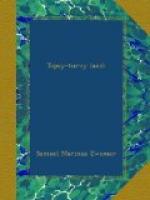When the shopkeeper leaves his shop for a half hour or so he hangs a sort of fish-net over the opening of his shop and never needs to lock it. This is a curious custom, and I have often wondered how the shops were safe from stealing boys or robbers in such cases. It is one more instance of how different the East is from the West.
The shopkeepers generally close their shops at sunset, and only in a very few places are there people who buy and sell or go about to do shopping by lamplight. Our grocer on the corner has provided for emergencies, and the large Arabian lantern ought to light up all his little shop.
Across the street is the place where they sell crockery. The salesman is out, but his boy, as you see, has taken the opportunity to eat some apples. I wonder whether he got them at the grocer’s?
[Illustration: ARAB BOY IN A CROCKERY SHOP. (Float this image to the right.)]
His father sells water-jugs and jars made of porous earth. Oh what a blessing those jars are to all the people of this hot and dry country. We have no ice in Arabia and so no refrigerators; the wells are never very deep and the water comes a long distance. So if it were not for the crockery man and his water-jugs we could never drink cold water. But just pour the water in one of these earthen pots and hang it in the wind and then in a few minutes the water gets cold. We missionaries always have such water-jars hanging or standing in our windows to catch the breeze. Perhaps this kind of water-cooler is very old, and Solomon himself looked at one when he wrote the words: “As cold waters to a thirsty soul so is good news from a far country.”
VI
BLIND FATIMAH
It was on a Sunday afternoon that I first met Blind Fatimah and greeted her with Salaam aleikum and she answered aleikum es salaam! “Peace be to you and on you be peace.” I asked if she could read. She said she could “read by heart,” but could not see anything. She at that time could repeat twenty-six chapters of the Koran, the sacred book of the Mohammedans. Now I think she can repeat it nearly all; it contains one hundred and fourteen chapters. Some are very short and others are very long; some parts of the book are very good, but most of it is a jumble of events and of things that never happened—all mixed up topsy-turvy.
A slave woman was Fatimah’s teacher and now she is helper in the school of this teacher. She is the prompter, and always begins each sentence of the recitation, and the other children follow on. If any mistakes are made, she will instantly correct them.




